Key takeaways:
- Understanding cultural nuances and fostering personal connections are crucial for successful cross-border negotiations.
- Key factors such as trust, preparation, and flexibility significantly enhance communication and collaboration during negotiations.
- Active listening and focusing on underlying interests rather than positions can effectively resolve conflicts and lead to innovative solutions.
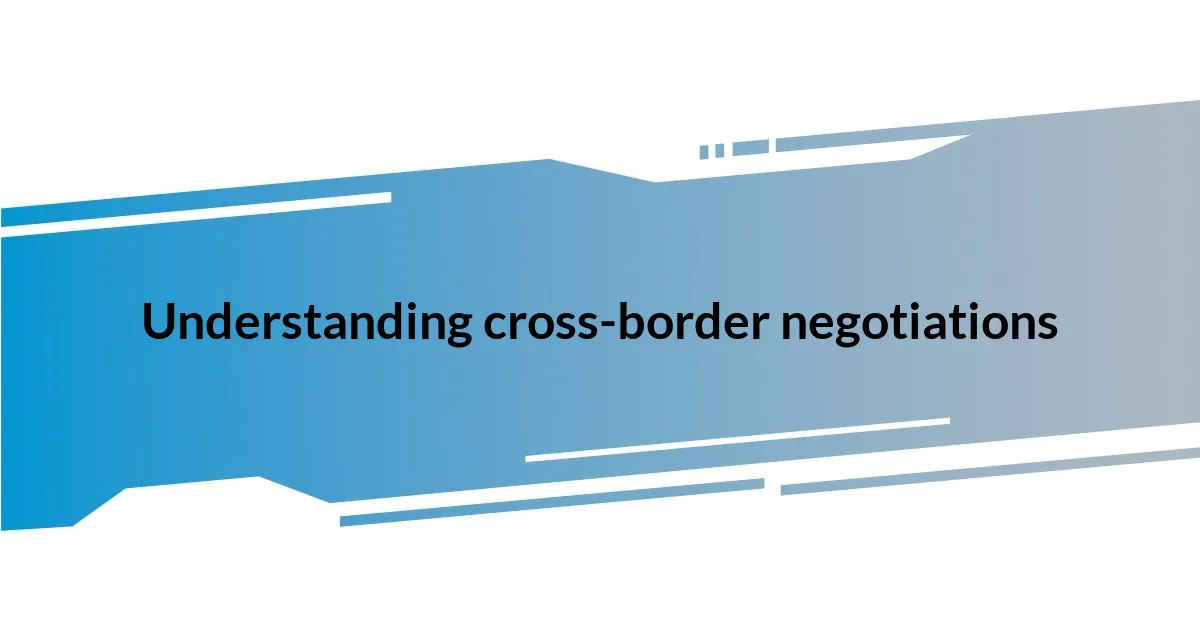
Understanding cross-border negotiations
Cross-border negotiations are a fascinating blend of culture, strategy, and human interaction. I remember sitting across the table from representatives from another country, and I could feel the tension in the air, almost like an unspoken language. Understanding cultural nuances can truly shape the negotiation process—things like body language, tone, and even the timing of responses can take on a whole new meaning when you’re dealing with different backgrounds.
Have you ever considered how assumptions can derail negotiations? I learned this firsthand during a negotiation with a team from Japan. While I expected directness, they approached discussions with a more indirect style, which initially left me puzzled. It made me realize that listening is just as crucial as speaking—understanding where your counterparts are coming from could lead to a breakthrough in what might seem like a stalled conversation.
Furthermore, I find that building rapport is often underestimated in the context of international dealings. One time, I shared a personal story about my own cultural experiences, and it instantly changed the atmosphere. Suddenly, we weren’t just negotiators but two people finding common ground; it was a powerful reminder of how our shared humanity can drive successful outcomes in cross-border negotiations.
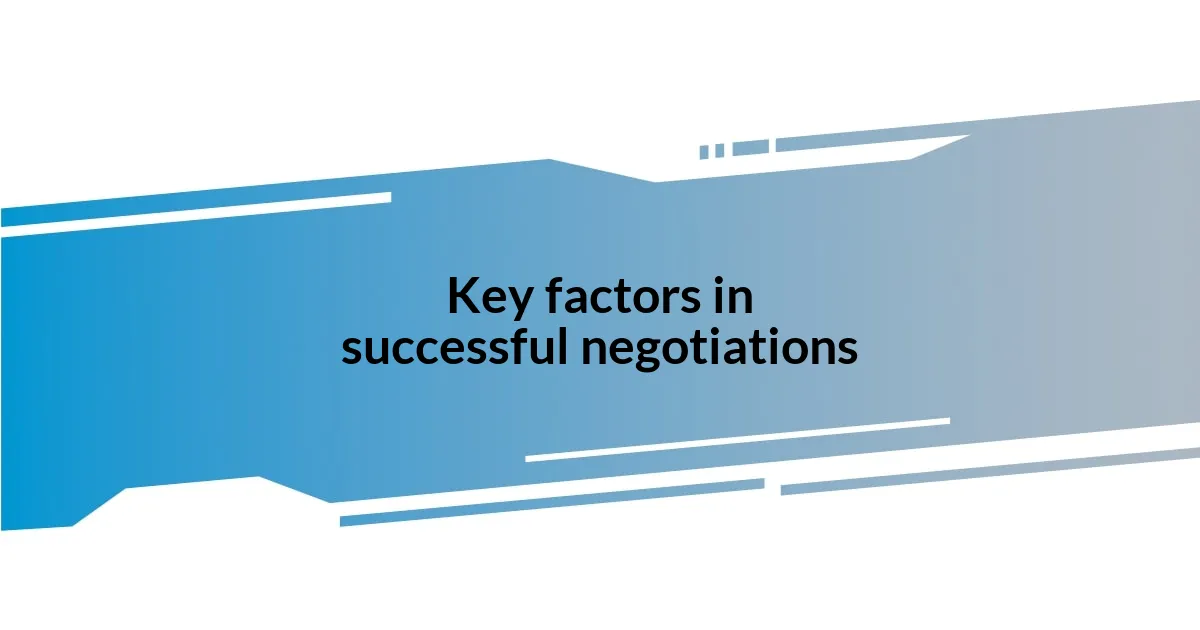
Key factors in successful negotiations
Key factors in successful negotiations often boil down to trust, preparation, and flexibility. I recall negotiating a partnership with a firm in Brazil where trust was paramount. Initially, I was focused solely on the deal’s terms, but it became clear that building a relationship was just as important. Once I invested time to understand their values and motives, the negotiation evolved into a collaborative effort, paving the way for a mutually beneficial outcome.
Preparation is another crucial element that can make or break negotiations. I remember diving deep into research before engaging with a European company. I took the time to understand not just their business model, but also their cultural backdrop. This knowledge not only informed our discussions but also made them feel respected and understood. In my experience, thorough preparation lays the groundwork for effective communication and problem-solving, as it equips you with insights that lead to more tailored and impactful dialogue.
Flexibility cannot be overlooked either. Once in a negotiation with a team from India, I had to pivot my approach when unexpected challenges arose. Rather than adhering rigidly to my initial plan, I adapted to their concerns, leading to a more creative solution. This incident taught me that remaining open-minded can unlock unexpected avenues, ultimately enhancing the negotiation process.
| Key Factor | Importance |
|---|---|
| Trust | Builds rapport and encourages open dialogue |
| Preparation | Informs discussions and demonstrates respect |
| Flexibility | Allows adaptation to changing dynamics |
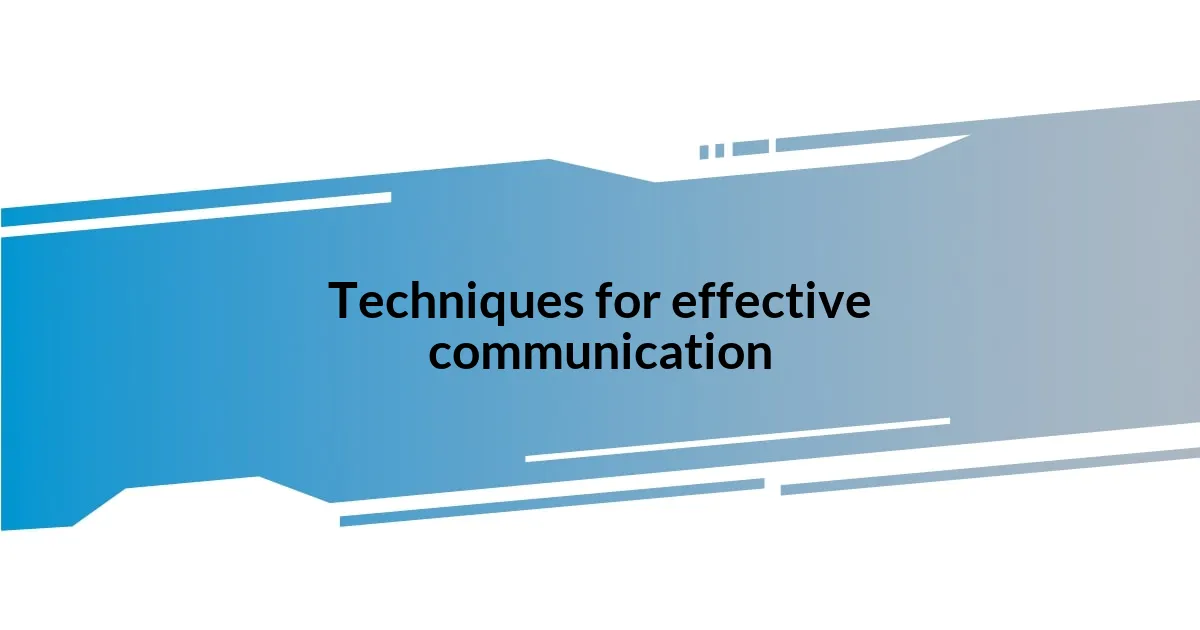
Techniques for effective communication
Effective communication in cross-border negotiations is an art that requires conscious effort and mindfulness. I often remind myself that clarity is paramount. The times when I’ve opted for straightforward language, avoiding jargon, have led to smoother exchanges. I recall a negotiation with a tech firm in Germany where I used simple visuals to illustrate complex ideas. The relief in their expressions as they grasped the concepts was palpable, showing just how vital clear communication can be.
To enhance communication, here are some techniques that have worked well for me:
-
Active Listening: I focus on fully understanding my counterpart’s perspective before responding. This not only builds trust but also reveals underlying interests.
-
Cultural Acknowledgment: I make it a point to acknowledge cultural differences explicitly. For example, I once started a meeting with a common local phrase, which instantly bridged the gap and set a positive tone.
-
Non-Verbal Cues: I pay attention to body language, both my own and that of others. A nod, smile, or maintaining eye contact can create an atmosphere of goodwill and openness.
-
Feedback Loops: I regularly summarize what has been discussed to confirm understanding. I find that this practice not only clarifies but also encourages others to share their thoughts more freely.
-
Patience: Sometimes, allowing for pauses in the conversation can yield deeper insights. I’ve found that giving time after sensitive topics allows for reflection and often leads to richer dialogue.
Each of these approaches has contributed to my success in fostering collaborative and effective discussions, making the often daunting process of negotiation feel more personal and connected.
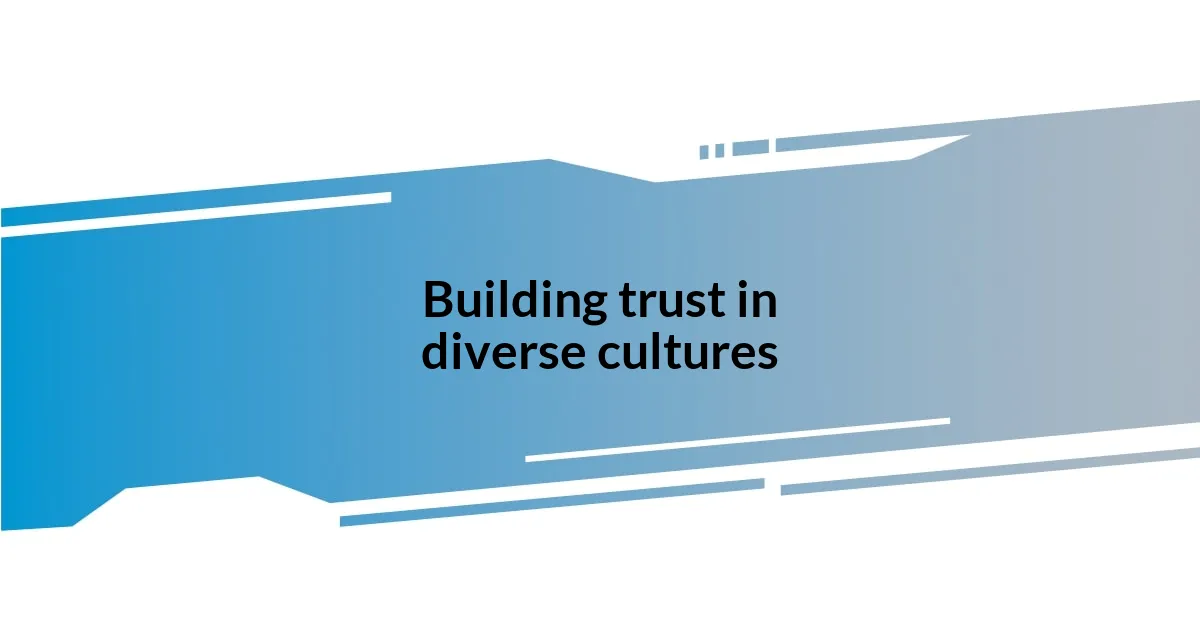
Building trust in diverse cultures
Building trust in diverse cultures can sometimes feel like navigating a maze, but I’ve found that a personal touch goes a long way. During a negotiation with a Japanese firm, I learned the value of patience and attentiveness. In those early meetings, I allowed silences to linger; it wasn’t uncomfortable for them, but instead a natural part of their communication style. This experience made me realize that respect for cultural differences truly cements trust.
I also cherish the moments when informal interactions have paved the way for more substantial business discussions. For instance, sharing a meal with my counterparts in Turkey not only broke down barriers but also fostered a sense of camaraderie. Over dishes of kebabs and baklava, we laughed and shared stories, which deepened our understanding beyond just numbers and contracts. Isn’t it remarkable how food can bridge gaps that language sometimes cannot?
Moreover, I believe transparency plays a vital role in trust-building. When negotiating with a team from South Africa, openness about my own limitations and intentions created a safe space for them to do the same. They responded with honesty, and instead of feeling vulnerable, we formed a partnership grounded in mutual respect. This taught me that sometimes, revealing a bit of ourselves can draw others in, making negotiations feel more like a collaborative journey than a transaction.
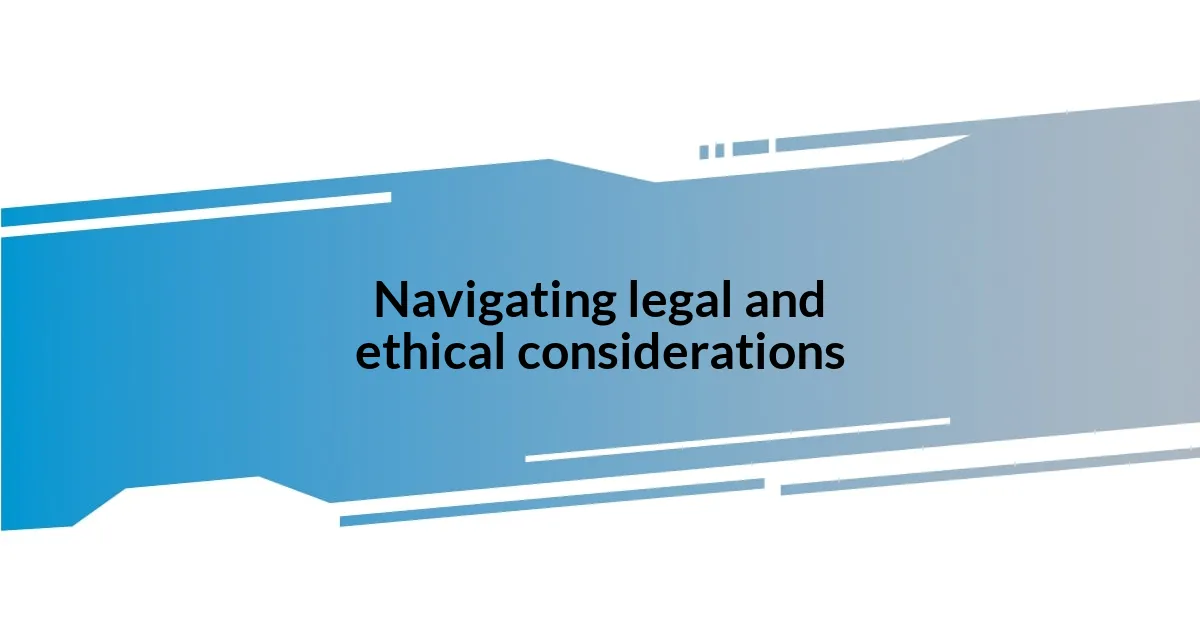
Navigating legal and ethical considerations
Navigating the legal and ethical landscape in cross-border negotiations is paramount. I’ve found that unfamiliar regulations can create significant hurdles, but approaching these hurdles with transparency can smooth the process. During a negotiation with a Brazilian counterpart, I made it a point to discuss local compliance openly, and that honesty fostered mutual respect. It’s fascinating how being upfront about legal obligations can strengthen trust rather than weaken it.
I’ve also learned that ethical considerations are often deeply rooted in cultural norms. When working on a project in India, I encountered differences in business practices that raised ethical questions for me. Rather than shying away from them, I sought clarification by asking specific questions about their customs. Engaging in these discussions opened a channel of understanding that transformed potential conflicts into collaborative problem-solving. Have you ever faced similar dilemmas? I encourage you to lean into those conversations; they can yield insights that are both eye-opening and enriching.
Lastly, I believe maintaining integrity during negotiations is non-negotiable. I once found myself at a crossroads while negotiating with partners in France, where I realized that bending the truth to secure a deal would backfire. Instead, I opted for a straightforward approach, presenting all facts clearly. The outcome might not have been what I initially hoped for, but it certainly laid the foundation for a relationship built on trust and respect. Upholding ethical standards, even when it’s challenging, is something I firmly stand by—it’s a practice that pays dividends in the long run.
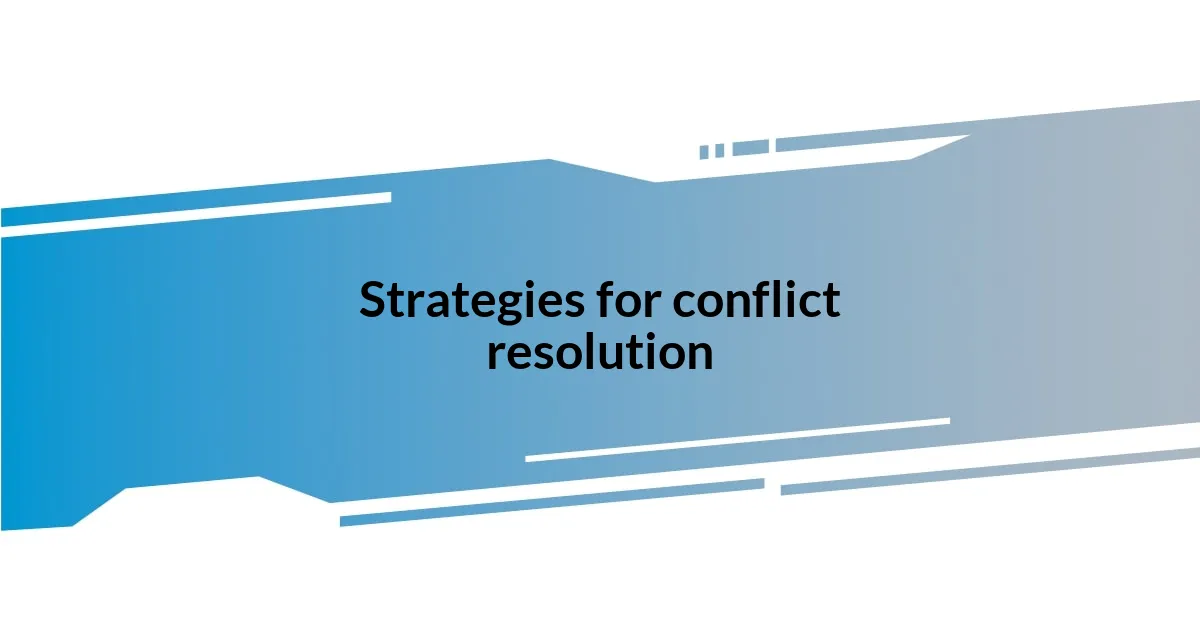
Strategies for conflict resolution
When it comes to resolving conflicts in cross-border negotiations, I’ve found that active listening is a game changer. In a recent project with a Canadian team, I noticed how their concerns about project timelines echoed beneath the surface. Instead of jumping in with my own points, I paused and genuinely listened. This simple shift not only clarified the issues but also made my Canadian counterparts feel heard and valued. Have you ever experienced how taking a step back can illuminate the path forward?
Creating common ground is another strategy that can defuse tensions. I recall a tense negotiation with a group from Germany, where differing opinions on budget allocations led to frustration. Instead of dwelling on our differences, I suggested we brainstorm solutions together over coffee. It was incredible to see what happened next—once we shared ideas without the pressure of formality, the atmosphere lightened, and innovative solutions began to flow. Isn’t it amazing how shared experiences can turn adversaries into allies?
Lastly, I advocate for focusing on interests rather than positions. During a negotiation with a client from Mexico, we were initially stuck over product specifications. I realized that instead of insisting on fixed terms, I should explore the underlying needs driving their requests. This approach opened a dialogue that revealed their goal was flexibility for future changes, not rigidity. This epiphany not only resolved the negotiation but reinforced a partnership mindset. Have you tried uncovering the “why” behind demands? It often leads to breakthroughs.
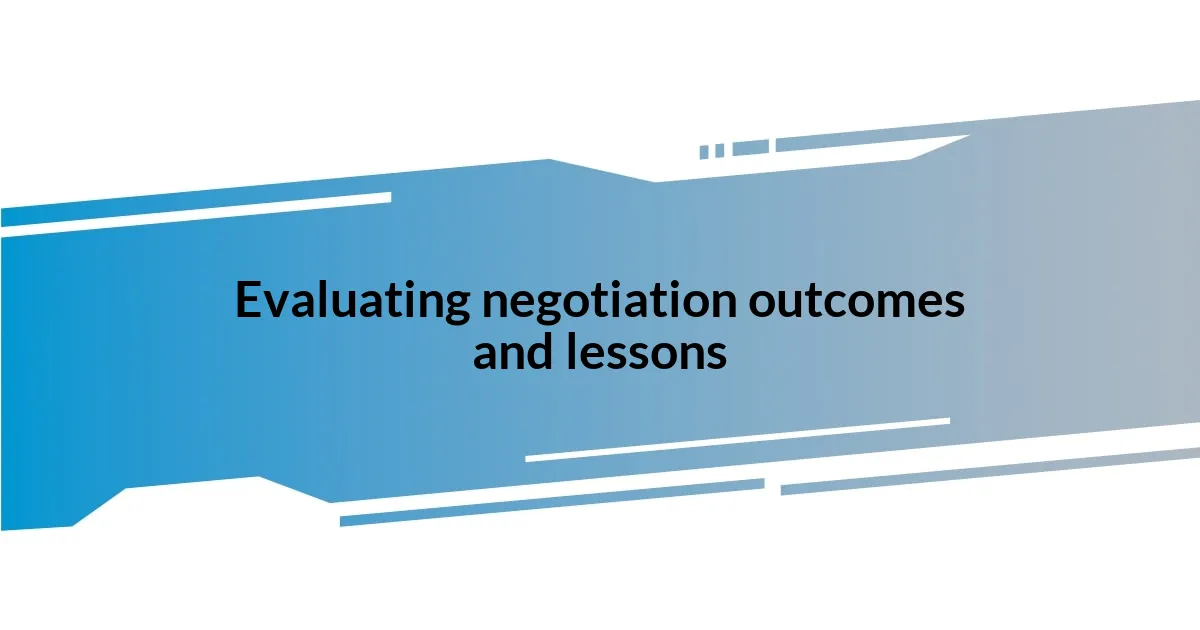
Evaluating negotiation outcomes and lessons
Evaluating negotiation outcomes is an essential part of my learning process. After concluding a deal in Japan, I took the time to reflect on what went well and what didn’t. I realized that even small nuances in communication impact the overall success of negotiations. Have you ever found yourself thinking back on a negotiation and discovering lessons you didn’t recognize in the moment?
One particular lesson stands out for me: always prioritize follow-up. After a successful negotiation with a diverse team from South Africa, I sent out a summary email. This simple act not only confirmed our agreements but also showed my commitment to maintaining the relationship. It’s interesting how a little effort in follow-up can reinforce trust and clarity. How do you ensure that your agreements don’t just fade into ambiguity?
Another insight I’ve gained is the importance of adaptability. Recently, while negotiating with a partner in Italy, unexpected complications emerged due to regulatory changes. Instead of sticking rigidly to our original plan, I embraced flexibility, and this approach allowed us to explore alternative solutions. It’s fascinating how being open to change can lead to innovative outcomes. Have you experienced moments where flexibility shifted the course of a negotiation? I encourage you to see adaptability not just as a strategy but as a mindset that can unlock new possibilities.
